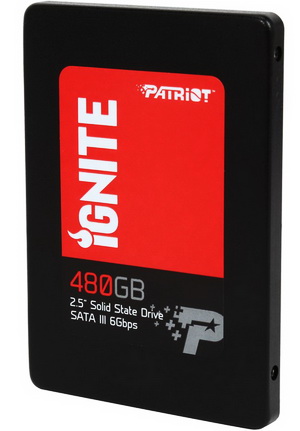INTRODUCTION
Solid state drives (SSDs) may not be as interesting as they were upon their launch and until a couple of years ago but they are still amongst the hottest hardware components in the market something which you can easily tell just by looking at the number of models manufacturers have released just in the last year. Now as many of you know performance levels haven't really increased that much in the consumer oriented SSD market (SATA III models especially) during the past 2-3 years but we have seen a pretty significant price drop so as we speak consumers can get their hands on 480GB SATA III models for the same price one would need to get a 240GB SATA III model back in 2013. One such model is the latest Ignite 480GB SATA III SSD by Patriot Memory and today we're going to see how it compares against similar models in the market.
Patriot Memory designs, manufactures and markets high performance, enthusiast memory modules, flash products, and computing technologies. Patriot products have become world renown for their extreme performance, reliability and innovation. Patriot Memory sells its products through original equipment manufacturers, retailers, e-tailers and distributors throughout the world with operations in North America, Asia and Europe. Patriot Memory LLC was founded in 1985 and is headquartered in Fremont, California, USA.
Much like the SSDNow KC310 SSD line by Kingston the Ignite line by Patriot Memory also features Phison’s PS3110-S10 quad-core 8-channel NAND flash controller (featuring TRIM, NCQ, ETEP, Smart ECC, AES 256Bit encryption and TCG support) with DRAM cache by Nanya (512MB at 1333MHz for the 480GB model) but whereas Kingston has used 19nm Toshiba toggle MLC NAND flash memory modules for their line Patriot Memory chose to go with 16nm Micron asynchronous MLC NAND flash to keep costs low something which will most likely affect performance levels and not in a good way. Performance specifications by Patriot Memory however for the Ignite 480GB model state that it can offer sequential read/write of up to 560-545MB/s and 4K random read/write IOPS of up to 80-75K so if these are correct then we may have a nicely balanced price/performance model in our hands.

 O-Sense
O-Sense








.png)

